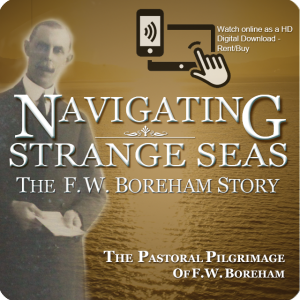
VI
THE MIDDLE WICKET
‘HE allus aims for t’ middle wicket!’ I came upon the suggestive and emphatic assertion in the Memorials and Correspondence of John Brash. The author, Mr. I.E. Page, is discussing the secret of the evangelist’s success, and he allows one of his hearers to hazard a conjecture. ‘Mr. Brash,’ exclaims this man bluntly, ‘allus aims for t’ middle wicket!’
Now this is good, distinctly good. And, beside this good thing, I lay another thing as good as itself. I came upon it in Mr. Edward Smith’s Mending Men. Those who know the book have fallen in love with Sam. I did; and Mr Smith wrote to thank me for my public declaration of affection. The pity of it is that whilst his letter was on its long, long, voyage from England to Australia, the hand that wrote both it and the story of Sam laid down the pen for ever. But Sam remains, and I am glad that Mr. Smith lived long enough to introduce him to us. For Sam makes a brave figure. On one important occasion he was invited to speak at a certain manufacturing town in England. A great crowd was assembled, and the vicar, who presided, was delighted; but he remarked to Sam afterwards:
‘How is it you are able to interest so many?’
‘Well, sir, I shoots ’em!’ Sam replied.
‘Shoot ’em! What do you mean?’
‘Well, you parsons all tries to, but your at the head, and misses; the shots go clean over: I always goes for the third button on the waistcoat!’ ‘Capital!’ replied the vicar; ‘I’ll not forget the lesson, and will try henceforth for the heart!’
‘The middle wicket!’ says Mr. Brash.
‘The third button!’ cries Sam.
These two things side by side smite me on the face with the force of a stinging rebuke.
It is so easy to forget that our first appeal is to the emotions. Apologetics have their place, but it is quite a secondary place. ‘How limited is the force of human reason!’ exclaims Lord Beaconsfield, in Coningsby. ‘We are not indebted to the reason of man for any of the great achievements which are the landmarks of human progress. It was not reason that besieged Troy: it was not reason that sent forth the Saracen from the desert to conquer the world: it was not reason that inspired the crusader and established the monastic orders it was not reason that created the French Revolution. Man is only great when he acts from the passions, never irresistible but when he appeals to the imagination.’ Clearly, therefore, we preachers are too fond of arguing; too fond of proving things; too fond of rounding off our paragraphs with a triumphant Q.E.D.
And this sort of preaching brings its own rebuke. Just when we are in the midst of it, along comes an evangelist-Mr. Smith’s ‘Sam,’ for example. His logic is enough to make poor Euclid turn in his ancient grave. But, in spite of that, he moves men to tears, stabs their consciences, and eventually wins their hearts. I say ‘in spite of that,’ for I do not wish it to be understood that it is as a result of his faulty argument that he achieves his triumph, I would rather have my chimney swept by a logical sweep than by an illogical sweep. But it is indisputable that an atrociously illogical chimney-sweep might remove every speck of soot from my flues, whilst a modern Euclid would leave them as filthy as ever if he relied altogether on his logic. In precisely the same way, I would very much rather hear an accurate than an inaccurate preacher. I expect my minister to give me correct pronunciation, faultless logic, and resistless argument. But, for all that, it is indisputable that these things can no more save a soul than they can sweep a chimney. And the preacher who leans upon them will have the mortifying experience of Mr. Smith’s vicar. He will see another man, lacking all these most excellent qualities, come along and achieve the end for which he himself has been labouring so long.
I am sure that most of us have been too scared of emotionalism. We forget that man is a most emotional animal. It is his very emotionalism that leads him to pretend that he is not emotional at all. I came upon a striking instance of this the other afternoon. I was on a tram in Dandenong Road. The car stopped, and a man of about five-and-thirty helped an elderly lady and a little girl to the seat opposite me. Then, very abruptly, he turned and walked away.
‘Good-bye, daddy!’ the little girl called after him; and she addressed the lady as grandma. My fellow-passengers were evidently the man’s mother and daughter; yet he had turned his back upon them and walked away without a word of farewell, without even a smile! I was astounded at his heartlessness.
Before the tram reached the terminus, however, I made friends with the little girl and got into conversation with her companion. I found that the child had just lost her mother: the grandmother was taking her to her own home for the time being and this was the first parting between father and daughter. The man had turned away so abruptly, not because he was destitute of emotion, but because he did not wish others to witness the intensity of his grief.
Or change the scene. A great sporting journal recently described an English cricket team taking the field for an important match. Twenty thousand eyes are fastened upon the players, and they know it. Yet they stroll out in the most off-hand and casual manner. They look as if they have no object in life, no business on hand, and are feeling unutterably bored. Each man adopts some device of his own for appearing indolent, indifferent, unconcerned. ‘Of course,’ this writer goes on to say, ‘it is all a piece of make-believe. Your first-class cricketer hates to show that he has any emotions. He likes to be regarded as a mass of ice or a block of marble. Any exuberance of feeling is supposed to involve bad form.’ It is just because the players feel so deeply that they are so careful to pose as though they do not feel at all. Now this is intensely characteristic, and we preachers and teachers will be the silliest of dupes if we allow men to trick us. The cold-blooded appearance of our congregations is very, very often a mere game of make-believe. The Scot is not the only man who hates to show his feeling. The third button is, after all, a wonderfully vulnerable spot. Leg theory and off theory are all very well; but there remains something to be said for bowling at the middle wicket.
We are palpitating bundles of emotion. No man will believe it about himself, but every man will believe it of every other man. The novelist has no doubt about it, for he knows that there is no date in the history of English literature more epoch-making than the date on which Samuel Richardson discovered that fiction would be amazingly more popular if suffused with sentiment. The statesman knows it, for experience has taught him that there is no appeal quite as effective as a sentimental appeal. The barrister knows it, for he has addressed too many juries to be ignorant of their susceptibilities. We all recognize, when we come to think of it, that love, hate, pity, shame, jealousy, sympathy, revenge-the great master-passions that sway us and make us what we are-are all of them matters of sentiment, and that sentiment governs the world. The preacher is slow to discover that the shortest cut to conscience is by way of the emotions.
Why, the story of the Church is written in chapters of emotionalism and floods of tears! It was so, even in the Old Testament. `Speak ye home to the heart of Jerusalem, saith the Lord.’ The Hebrew words indicate, Sir George Adam Smith tells us, that a prophet is to stir the soul of the people as a lover stirs the heart of a lass when he makes his great appeal and wins her. It is ever so. From the day of Pentecost until this day the great epochs of Church history have been distinguished by waves of emotion, storms of feeling, tempests of tears. All that we know for certain about the impression made on those first three thousand Christian converts is that they were ‘cut to the heart.’ Methodism was born, and the whole history of England remodelled, when, on that never-to-be-forgotten day at Aldersgate Street, John Wesley felt ‘his heart strangely warmed.’ And we all know how Whitefield won his memorable triumphs on both sides of the Atlantic. It is impossible even now to read those billowy sermons, in cold and passionless type, without being moved and melted. And what must their delivery have been? No wonder that strong men were bowed with weeping, and that the hardest wrung their hands in anguish. Whittier has finely immortalized it in The Preacher:
So the flood of emotion deep and strong
Troubled the land as it swept along,
But left a result of holier lives.
Without a single exception, the stories of the great revivals in Scotland, Wales, and everywhere else, point us along the same road. Men are strangely susceptible at this very point, and out of their very susceptibility arises the reluctance of the preacher to strike home. But let him show no mercy. Paris must aim at the heel of Achilles. The third button is the strategic point that dominates the whole situation. ‘Never mind the dogmas of the schools,’ exclaimed Laurence Sterne once, ‘but get straight to the heart!’
I have already said that appearances conspire to deceive. Men struggle like Titans to show themselves callous, and they struggle most frantically when they feel most deeply. A young minister is shy of speaking frankly to cultured or wealthy people on the things that lie nearest his own heart. There is something fearfully forbidding in the very atmosphere of refinement. But the mistaken reserve will not last long. Experience will soon teach him that there are aching hearts in castles as well as in cottages; and that the most finished culture capitulates on demand to the philosophy of the third button. I met with a striking and beautiful instance quite recently. It occurs in Edith Sichel’s delightful biography of Alfred Ainger. Ainger was the son of a Unitarian. His mother died whilst he was still in infancy. The home was one of great comfort and of some luxury; but it possessed no religious atmosphere at all. Ainger sometimes attended Unitarian services and sometimes went to the Church of England. At length, he went regularly to hear Frederick Benison Maurice. Maurice was then professor of theology at King’s College, and the author of Moral and Metaphysical Philosophy. An onlooker would never have suspected the studious and pale-faced schoolboy, attending the lectures of the brilliant Anglican professor, of undue emotionalism. Yet, amidst such circumstances, those deep impressions were made which shaped his entire life. Maurice captivated not so much his intellect as his heart. His biographer tells us that ‘the faith which was to last him his life, to comfort and restrain and uphold him, came to him as a great emotion, making all things new. And Maurice always remained its representative.’ It rushed into his heart like a rising tide, pouring its surging volume into every crevice and cranny. He himself wrote of it later on. ‘It is sixteen years since that balmy summer afternoon when I heard him preach on the raising of Lazarus in the solemn, quiet chapel of Lincoln’s Inn; and even as I write I see the “prophets blazoned on the panes” of the ancient windows, and look up to that living prophet face which no one who ever saw it could forget, and hear once more
…The trembling fervency of prayer
With which he led our souls the prayerful way.’
I am not unaware of the peril into which all this may lead. There is nothing in home or class or pulpit more repellent than sickly sentimentalism, maudlin pathos, the treacherous trickery of tears. But I am not afraid. I write as to sane men who know how to marshal their facts, state their arguments and plead their cause. And to such men I pass on the priceless philosophy of the Middle Wicket and the Third Button. Depend upon it, the third button is the most susceptible, the most vulnerable, and therefore the most hopeful, point at which the great assault upon Mansoul can be made. It is more sensitive than the point of the finger or the pupil of the eye. The preacher who neglects that strategic situation is like a besieging general who turns his back on the unguarded gate, and makes his attack at the very point at which the entire strength of the garrison has been massed.
-F.W. Boreham




